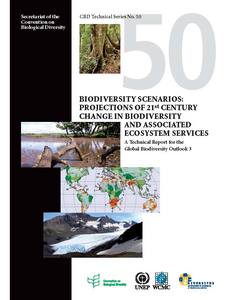Tropical Coral Reefs (Appendix 10)
Figueiredo, Joana (2010) Tropical Coral Reefs (Appendix 10). In: Leadley, P., Pereira, H.M., Alkemade, R., Fernandez-Manjarrés, J.F., Proença, V., Scharlemann, J.P.W., and Walpole, M.J., (eds.) Biodiversity Scenarios: Projections of 21st century change in biodiversity and associated ecosystem services : a technical report for the global biodiversity outlook 3. CBD Technical Series (50). Secretariat of the Convention on Biological Diversity, Montreal, Canada, pp. 125-132.
![[img]](https://researchonline.jcu.edu.au/16041/4.hassmallThumbnailVersion/16041_Figueiredo_2010.jpg)
|
Image (JPEG) (Book Cover)
- Cover Image
Download (103kB) |
|
|
PDF (Published Version)
- Published Version
Download (9MB) |
Abstract
SUMMARY: Coral reef ecosystems are biodiversity hotspots that support numerous plant and animal species. The reefs are composed by calcium carbonate mainly deposited by scleractinian corals. Scleractinian coral distribution is limited by various environmental variables such as sea-surface temperature, light, depth, pH, salinity, and nutrient and sediment concentration. These ecosystems are currently threatened by localized non-climate stresses such as overfishing and destructive fishing practices, pollution, terrestrial nutrient and sediment run-off, and direct and indirect impacts of climate change.
Coral reefs provide several invaluable ecosystems services with high socio-economic value: tourism, fisheries (food and employment), nutrient cycling, climate regulation, protection of the shoreline and other ecosystems (e.g. mangroves), and constitute the habitat for several species (marine, aerial and terrestrial species) and support human populations as well.
Rising atmospheric CO2 concentrations have already led to a slight acidification of oceans and are projected to lead to levels of acidification that will severely impede calcium carbonate accretion. Global warming associated with greenhouse gas emissions has resulted in increased sea-surface temperatures, leading to frequent coral bleaching. Acidification and the increased frequency of local and global disturbances are projected to seriously degrade coral reefs world wide.
If current trends continue coral reef ecosystems may undergo regime shifts from coral to algae dominated habitats. The tipping point for this phase shift is estimated to be a sea-surface temperature increase of 2°C and/or atmospheric CO2 concentrations above 480 ppm (estimated to occur by 2050).
Shifts in dominance from corals to sponges or algae would have dramatic consequences for coral reef communities. The reduction of habitat complexity through erosion would reduce the niches for several species that rely on corals for shelter, food, substrate, settlement and nursery.
In order to avoid this phase shift, local and global action is necessary. Reducing local stresses is paramount to promote a higher resistance to disturbance and ensure ecosystem resilience. Coastal areas should reduce the terrestrial input of sediment, nutrient and pollutants. Fisheries require the sustainable management of marine species and should be particularly conservative with the extraction of key functional groups such as the herbivores that control algae growth. Marine protected areas networks should be designed and implemented to provide refuges and serve as larval sources to replenish harvested areas outside the reserve. Globally, reduction of CO2 emissions would help reduce sea surface temperature increase and water acidification.
| Item ID: | 16041 |
|---|---|
| Item Type: | Book Chapter (Non-Commercial) |
| ISBN: | 978-92-9225-219-4 |
| Date Deposited: | 09 May 2011 22:45 |
| FoR Codes: | 05 ENVIRONMENTAL SCIENCES > 0502 Environmental Science and Management > 050209 Natural Resource Management @ 25% 05 ENVIRONMENTAL SCIENCES > 0502 Environmental Science and Management > 050202 Conservation and Biodiversity @ 25% 05 ENVIRONMENTAL SCIENCES > 0501 Ecological Applications > 050101 Ecological Impacts of Climate Change @ 50% |
| SEO Codes: | 96 ENVIRONMENT > 9603 Climate and Climate Change > 960301 Climate Change Adaptation Measures @ 25% 96 ENVIRONMENT > 9603 Climate and Climate Change > 960302 Climate Change Mitigation Strategies @ 25% 96 ENVIRONMENT > 9603 Climate and Climate Change > 960305 Ecosystem Adaptation to Climate Change @ 50% |
| Downloads: |
Total: 1583 Last 12 Months: 55 |
| More Statistics |



